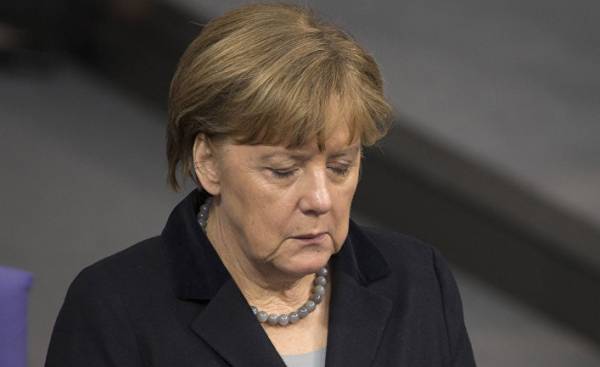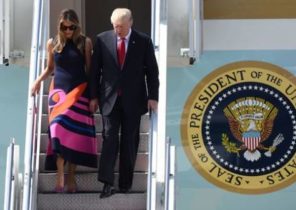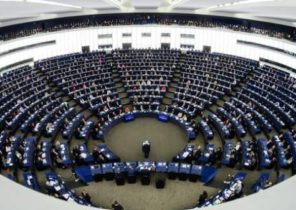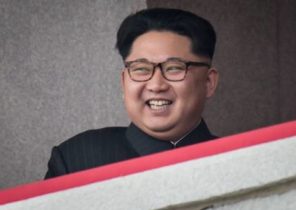
Das Erste: Madam Chancellor, You said that the EU is, perhaps, the biggest challenges in history. Do You see the danger of the collapse of the EU?
Angela Merkel: first, I am pleased that we celebrate the 60th anniversary of the European Union, if we take the Roman treaties as a starting point. The European Union is facing really big challenges that we also identified in the adopted in the Rome Declaration. Something we have started to do more yet. And I don’t believe that we can’t handle, and I bet that we, even if there are difficulties, will be able to cope with them, with perseverance and cooperation. There are some topics that are very, very difficult, for example, solidarity in the distribution of refugees, It is quite a thick Board that we have to drill. But if we do not take for it with all his strength, then anything good will not achieve. And so from me and from other heads of state and government expected the force to turn the situation in a positive way.
— So You don’t see such danger?
— I’m not blind to a difficult situation. But I think it’s worth to look at what we have achieved in the last two years. There is a joint European coast guard, which Germany all the time for years resisted, and now we are also together with other Europeans are willing to take responsibility. After all, last summer we were thinking do we need to do something with the joint defense policy. Now we have created a Central unit and stated that from there we want our European operations jointly run and jointly to prepare. When I look at all this, and I see the progress that we must build.
— What the project is, in Your opinion, is the most important, say, the next ten years? If You went to the demonstration in support of the EU, which would stand on Your banner? Previously, we had large projects, removal of barriers in the internal market,currency, what would be on Your banner?
Well, my banner would stand, first, that we can continue to live freely and move. You are talking about the domestic market, it is certainly a big deal that we can travel freely, that the goods can be transferred freely, that people can live where they want, what students can learn, where they want that we don’t build any barriers. And we see, in view of the challenges the refugee crisis as fast again introduces border control and how quickly people start to think about whether to build more defensive walls — for me this means that the preservation of freedom is in itself a great value.
Second, it combines the ability to defend themselves, to answer calls and keep people safe. And, thirdly, welfare, jobs and social protection.
Regarding the last two topics I would also like to ask You, if desirable, in Your opinion, the army of the EU, at least in the long run?
For me a closer and more close cooperation of separate armies already desirable. As it will later evolve, you will see one or two decades. We have, for example, in Germany the parliamentary army, but I don’t think that the German Bundestag should no longer allow the operation. But we have a lot of opportunities for the best combination of our weapons, in order to coordinate our joint political and military undertakings, that is to resolve conflicts. So we first have to do what we can do simply and very quickly.
For example, when the abolition of currency, the German mark, the Lira, the franc, the fact had to overcome many, say, traditions and habits. You’re not going to campaign for that, and at this point, for example, with regard to the right of the Parliament’s decision and said it is not really.
— I would currently not do this Central question, I would first have to agitate that we together took political decisions. We need much more collective understanding in foreign policy, a joint policy towards Russia for example, we found on the issue of Ukraine’s relations with Russia. A joint policy toward China, in my opinion, still leaves one wanting more. Now we are facing a great challenge to develop a joint position in the transatlantic relationship. And this, I think, would be the first step, and parallel to it also the combination of our abilities in the field of defense. But the foreign policy community, in my opinion, is a prerequisite, then military cooperation to take further steps.
— Another consideration about the future: Your Minister of foreign Affairs Mr. Gabriel demands — soon after the many billions of UK will not get in the EU budget — Germany here closed the gap, that is, would pay much more money in the European budget. Do You support it?
— I must honestly say that I do not want to conduct any negotiations on the budget. If we are on certain projects will need money, then we will have to find them in Europe. I say, for example, about the struggle against the causes of people fleeing other countries in Europe, as well as on border security. I’m not against it. But what now needs to do only Germany and whether then to participate, I discussed this issue with the 27 countries remaining in the EU after leaving the UK than now to make a single breakthrough.
— No totals “more billions from Germany,” and the distribution on all of our projects…
… to allocate to those projects that are important: we need to expand our internal digital market, we need to invest more in science and there is, in my opinion, a lot of good, worthwhile projects, and it will also discuss to the next meeting on the budget.
— Europe always promised to look after the welfare and the equalization of living conditions. Now we still have very rich countries in the North, as well as very poor, say, in the South-East Europe. How would You approach this problem?
— On the example of German unity, we see how long it lasts and how much money has already been invested to create equal conditions of life, e.g. Germany. And similar problem we see now also in the countries of Central and South-Eastern Europe. And I think we need to think about in some places to do more, I already talked about this — defence, border protection, internal security in the exchange of information. But in other places may provide more autonomy, creativity separate regions. For example, to change the borders of competitions on the European internal market. And this, too, we must say, that is, to apply the principle of subsidiarity — namely, that I can do better here? Then I might be able to new members or younger members to provide a bit more space to develop and with your powers, because only with the help of, so to speak, of equal financial mechanisms that we will pursue for too long.
— If it helps however to those people who have no work, for example, young people, because youth unemployment in Greece, Spain, Italy partially reaches 40% to 50%. If these steps do lead to a massive increase in the number of jobs?
— There is only one lever, which I could turn, then to say: now everyone has a job. We need to be competitive, we must invest in research and development, we need to reduce bureaucracy, we need to use digital chances. These are separate steps, which we then step by step we will create more jobs. View the new Federal States, for example, in Germany — we got we over the last ten years halve unemployment. It was a painful process, with many small and medium enterprises. The creation of the workplace should be simple and should not be too bureaucratic. In this direction should be and other countries. But I will say quite clearly. Europe only then will be able to justify the creation of a Union when people have the feeling that they have been in the European Union have work, well-being and future.
— Before this interview we tried to poll our listeners: what would they have asked? Constantly had one point that “the EU is not transparent,” that although You are at the meetings of the European Council, in Brussels, on the summits, but this happens behind closed doors. The Eurogroup is the body which currently has a very big impact on the lives of people in southern Europe. But there is no record about her work. Is it possible to keep it that way? If the idea is to again invoke the enthusiasm about Europe?
— I believe that Europe is quite clear. We, for example, in recent years it has gained a lot of parliamentary law, it was probably necessary. I can’t almost anything that would have not been discussed in the German Bundestag, experts or in the plenary. And this, of course, is also available for all other. Was at one time the reproach that trade agreements are discussed too closed, it was a very serious topic. I believe that in the Ceta, the canadian agreement, we found now a good solution and so we should probably do further other agreements — we have to see what you can show to the public. As you know, and wage negotiations in Germany are conducted not on the street, because sometimes you need to have your own negotiating position.
— I understand that very well, but are there any points where You would say that there could be something else to do?
— Yes, I’m saying, it would be possible. We have Ceta was informed by a much fuller, more intensely informed about the steps in negotiating a trade agreement with America. I almost never go to the meetings of the European Council, which would in advance did not inform the Parliament and then the Parliament gives me his expectations from the meeting.
— One more question. At the moment we have a situation in which, at least from the visible to many problems, a very deep dividing lines in Eastern Europe. There is Hungary, which does not want to adhere to the decided distribution of refugees. We have had dialogue about a legal state with Poland, which rebuilds the justice system, media landscape, which is not suitable to the values, which are also here in Rome once said — the state of law, freedom of speech. If all will remain, in the next budget period, in Your opinion, would it be correct to say. we then and money on development, as the only available means of pressure also reduce.
— I think first we have this occasion to talk with countries. And Commission is and does. And then the member countries will also have to comment that there are avenues of development. which cause concern. Just to bring it all now for money, I think it is not very good and besides I don’t want to threaten. Yes, I believe the threat is not necessary, and the rule of law and freedom are values as such and, in fact, it is a prerequisite to become a member of the European Union and so we are now talking about it with Turkey when it comes to negotiations, and will therefore talk about it and Poland, if it is decided that still these questions are answered insufficiently detailed and insufficiently transparent.
— So You in any case do not want to use the money to develop as, so to say, threats.
— I don’t want this interview to speak about the threats, and I want to change the fact that the provisions of the legal state, as we imagine, was observed everywhere in Europe.







